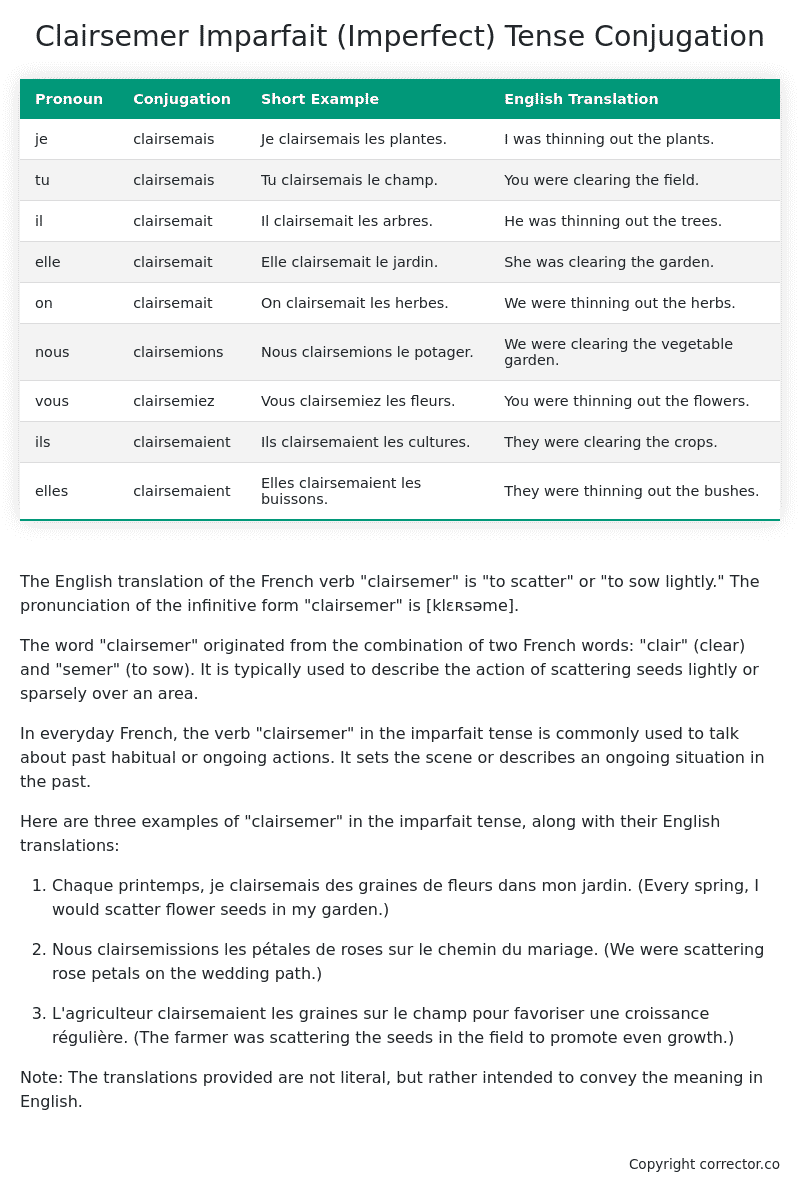Imparfait (Imperfect) Tense Conjugation of the French Verb clairsemer
Introduction to the verb clairsemer
The English translation of the French verb “clairsemer” is “to scatter” or “to sow lightly.” The pronunciation of the infinitive form “clairsemer” is [klɛʀsəme].
The word “clairsemer” originated from the combination of two French words: “clair” (clear) and “semer” (to sow). It is typically used to describe the action of scattering seeds lightly or sparsely over an area.
In everyday French, the verb “clairsemer” in the imparfait tense is commonly used to talk about past habitual or ongoing actions. It sets the scene or describes an ongoing situation in the past.
Here are three examples of “clairsemer” in the imparfait tense, along with their English translations:
-
Chaque printemps, je clairsemais des graines de fleurs dans mon jardin.
(Every spring, I would scatter flower seeds in my garden.) -
Nous clairsemissions les pétales de roses sur le chemin du mariage.
(We were scattering rose petals on the wedding path.) -
L’agriculteur clairsemaient les graines sur le champ pour favoriser une croissance régulière.
(The farmer was scattering the seeds in the field to promote even growth.)
Note: The translations provided are not literal, but rather intended to convey the meaning in English.
Table of the Imparfait (Imperfect) Tense Conjugation of clairsemer
| Pronoun | Conjugation | Short Example | English Translation |
|---|---|---|---|
| je | clairsemais | Je clairsemais les plantes. | I was thinning out the plants. |
| tu | clairsemais | Tu clairsemais le champ. | You were clearing the field. |
| il | clairsemait | Il clairsemait les arbres. | He was thinning out the trees. |
| elle | clairsemait | Elle clairsemait le jardin. | She was clearing the garden. |
| on | clairsemait | On clairsemait les herbes. | We were thinning out the herbs. |
| nous | clairsemions | Nous clairsemions le potager. | We were clearing the vegetable garden. |
| vous | clairsemiez | Vous clairsemiez les fleurs. | You were thinning out the flowers. |
| ils | clairsemaient | Ils clairsemaient les cultures. | They were clearing the crops. |
| elles | clairsemaient | Elles clairsemaient les buissons. | They were thinning out the bushes. |
Other Conjugations for Clairsemer.
Le Present (Present Tense) Conjugation of the French Verb clairsemer
Imparfait (Imperfect) Tense Conjugation of the French Verb clairsemer (You’re reading it right now!)
Passé Simple (Simple Past) Tense Conjugation of the French Verb clairsemer
Passé Composé (Present Perfect) Tense Conjugation of the French Verb clairsemer
Futur Simple (Simple Future) Tense Conjugation of the French Verb clairsemer
Futur Proche (Near Future) Tense Conjugation of the French Verb clairsemer
Plus-que-parfait (Pluperfect) Tense Conjugation of the French Verb clairsemer
Passé Antérieur (Past Anterior) Tense Conjugation of the French Verb clairsemer
Futur Antérieur (Future Anterior) Tense Conjugation of the French Verb clairsemer
Subjonctif Présent (Subjunctive Present) Tense Conjugation of the French Verb clairsemer
Subjonctif Passé (Subjunctive Past) Tense Conjugation of the French Verb clairsemer
Subjonctif Imparfait (Subjunctive Imperfect) Tense Conjugation of the French Verb clairsemer
Subjonctif Plus-que-parfait (Subjunctive Pluperfect) Tense Conjugation of the French Verb clairsemer
Conditionnel Présent (Conditional Present) Tense Conjugation of the French Verb clairsemer
Conditionnel Passé (Conditional Past) Tense Conjugation of the French Verb clairsemer
Conditionnel Passé II (Conditional Past II) Tense Conjugation of the French Verb clairsemer
L’impératif Présent (Imperative Present) Tense Conjugation of the French Verb clairsemer
L’impératif Passé (Imperative Past) Tense Conjugation of the French Verb clairsemer
L’infinitif Présent (Infinitive Present) Tense Conjugation of the French Verb clairsemer
L’infinitif Passé (Infinitive Past) Tense Conjugation of the French Verb clairsemer
Le Participe Présent (Present Participle) Tense Conjugation of the French Verb clairsemer
Le Participe Passé (Past Participle) Tense Conjugation of the French Verb clairsemer
Struggling with French verbs or the language in general? Why not use our free French Grammar Checker – no registration required!
Get a FREE Download Study Sheet of this Conjugation 🔥
Simply right click the image below, click “save image” and get your free reference for the clairsemer imparfait tense conjugation!

Clairsemer – About the French Imparfait Tense
NOTE: To take a deep dive into all the French tenses then see our article on Mastering French Tense Conjugation.
Formation of the Imparfait Tense
For regular -er verbs:
For regular -ir verbs
For regular -re verbs
Common Everyday Usage Patterns
Description of Past Habits
Background Information
Mental and Emotional States
It’s employed to express emotions, thoughts, or physical sensations in the past. For example: “J’étais content quand il est arrivé.” (I was happy when he arrived.)
Ongoing Actions
Points to Note About the Imparfait Tense
Passé Composé vs. Imparfait
Conditional
Si Clauses
Narration
I hope you enjoyed this article on the verb clairsemer. Still in a learning mood? Check out another TOTALLY random French verb imparfait conjugation!


